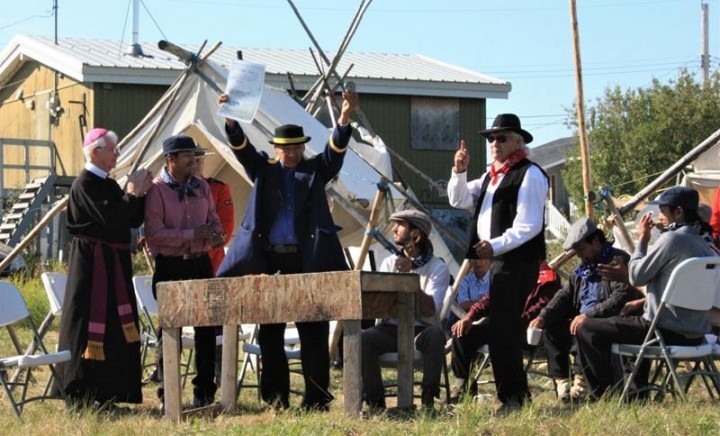BEHCHOKǪ̀, N.W.T. — As some communities in the Northwest Territories gather to celebrate 100 years since Treaty 11 was signed, many Indigenous people are reflecting on what the historic agreement means today.
The last of the numbered treaties between the Canadian government and Indigenous people, Treaty 11 travelled by river to nine signatory communities in 1921 and 1922. The document, which covers 950,000 square kilometres of what is now Yukon, the Northwest Terriroties and Nunavut, affects several Dehcho, Tlicho, Sahtu and Gwich’in communities.
Indigenous chiefs signed what they believed at the time was a treaty of peace and friendship on the understanding their rights to trap, hunt and fish on their traditional territory would be protected. The Canadian government, meanwhile, wanted to gain control of the land to pursue mineral and oil-and-gas exploration.
“The original treaty that was done in 1921 was for the best interest of the Dominion, so that they can have access to the natural and non-renewable resources for the greater society,” said John Zoe, a senior adviser to the Tlicho government who was chief negotiator when the Tlicho Agreement was ratified in 2005. It was the first combined comprehensive land claim and self-government agreement in the N.W.T.
Zoe said the Canadian government had already written Treaty 11 before heading north and Indigenous people were subsequently excluded from the growth of Canada.
When the treaty reached Behchoko, then known as Fort Rae, in the summer of 1921, many Tlicho people were wary as the promises made to them and the Denesuline who had signed Treaty 8 in Fort Resolution in 1900 had not been kept.
Following several days of negotiations, Chief Monfwi signed Treaty 11 on behalf of the Tlicho people on Aug. 22, 1921.
Today, the Tlicho region includes the communities of Behchoko, Whati, Gameti and Wekweeti.
Whati Chief Alfonz Nitsiza said Chief Monfwi was “very forceful” in ensuring Tlicho rights to harvest would not be restricted and he outlined their traditional territory on a map.
“We always over the years maintained that this is our homeland, this is our rights to harvest,” he said.
The Tlicho government now owns 39,000 square kilometres of land between Great Slave Lake and Great Bear Lake, including surface and subsurface rights.
At the time of signing Treaty 11, Chief Monfwi declared that “as long as the sun rises, the river flows and the land does not move, we will not be restricted from our way of life.”
Zoe said those words have been kept alive and helped to guide the modern Tlicho self-government agreement.
“We now have the ability to strengthen our relationship to our own lands, to our language, our cultural way of life of doing land-based activities — things that we should have been doing for a long time,” he said.
Former Dene national chief Norman Yak’eula’s grandfather, Chief Albert Wright, signed Treaty 11 in Fort Norman, now Tulita, on July 15, 1921. He said it wasn’t until the 1960s that Dene people saw the final wording of the treaty for the first time, and it wasn’t what they had agreed to.
“That’s where we got to see what kind of people the government were,” he said.
“We were dealing with not-so-honourable people of the federal government and churches. They had their agenda, they knew what they wanted, they knew the value of our land.”
Yak’eula said his grandfather was made chief by the government.
Decades after Treaty 8 and Treaty 11 were signed, many Indigenous people in the North challenged the fairness of the treaties and asserted their rights.
Tlicho gathered in Behchoko in 1968 and agreed to refuse to accept treaty payments.
A legal challenge of the proposed Mackenzie Valley Pipeline from more than a dozen Dene chiefs in the early 1970s, known as the Paulette case or Paulette caveat, saw the Supreme Court of Canada uphold findings that they had not relinquished their rights when they signed the treaties. The case helped lead to the negotiation of comprehensive land claim agreements.
Several communities marked the Treaty 11 centenary last summer with feasts, dancing, drumming, games and other traditional activities. Others such as Nahanni Butte and Behchoko waited to host festivities until this summer while Fort Liard has postponed celebrations until 2023.
Zoe said while treaty making is serious, there is also a need to celebrate.
“It’s about the spirit and the intent of the treaty that we must celebrate,” he said. “At the same time, we need to celebrate the agreement that we have with Canada to say that we’re finally recognized as having always been there.”
Yak’eula, who was the chief negotiator for the Sahtu Dene and Métis land claim and Tulita self-government agreement, said the treaty recognizes that the Dene are a nation.
“It means that we are a nation with a set of values, principles and our own way of life,” he said. “The second-most powerful treaties that we have are the comprehensive land claim agreements followed by self-government agreements.”
This report by The Canadian Press was first published Aug. 20, 2022.
___
This story was produced with the financial assistance of the Meta and Canadian Press News Fellowship.
Emily Blake, The Canadian Press
